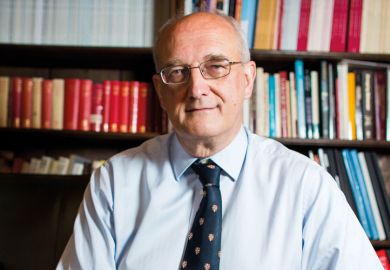The University of Cambridge’s stated average cost of educating an undergraduate has risen 7 per cent in a year to £18,000, resulting in a “funding gap” of £7,700 per student.
The final cost figure, which was published in the university’s official journal, The Reporter, takes into account “university expenditure” of £14,500 per student, minus a “college fee” of £4,400, giving net university expenditure of £10,100. “College expenditure” of £7,900 is added to give a final figure of £18,000.
Cambridge’s cost of an undergraduate education figure is potentially politically significant, as it is designed to highlight the shortfall between tuition fee income and public funding, and the actual cost of educating home and EU students.
In 2013, Andrew Hamilton, then vice-chancellor of the University of Oxford, used its “real cost” of education figure of £16,000 to call for the institution to be allowed to charge higher fees.
Cambridge’s figure of £18,000 for 2014-15 shows a sharp rise from the £16,800 figure stated for the previous year.
The figures were calculated using Trac, the Transparent Approach to Costing, a national framework used by universities to help them identify the cost of their activities.
Figures providing more information on the calculation were made available internally only at Cambridge, but have been seen by Times Higher Education.
These add that average fee income per student was £7,900 (in 2014-15 some students would have been paying £9,000, but some would have entered under the older fee regime).
Publicly funded teaching grant was £2,400 per student on average, giving a total income per student of £10,300.
That figure for income per student left a £7,700 “funding gap” compared with the total cost of £18,000, the calculation states.
A 2014 Cambridge webpage on the cost of undergraduate education figure includes a section titled: “Is the University of Cambridge calling for higher fees?”
The section states that “it is appropriate that some of the cost [of educating undergraduates] should be covered from the university’s own endowment”.
It adds that the university “has no set view on what future fee levels should be, but the increasing shortfall in meeting the cost of an undergraduate education is already affecting our ability to sustain our world-class research activity”.
The university’s endowment had a value of £2.5 billion in June 2015, according to the institution’s accounts. Cambridge’s colleges also have their own, additional endowments, with Trinity College’s alone worth around £1 billion.
Sir Leszek Borysiewicz, Cambridge’s vice-chancellor, told THE in 2015 that the institution is “able to sustain” the total cost of undergraduate education “on the current fee, based on the performance of our investments”, and would be “concerned about increases in fees” as a threat to student access. His term of office ends next year.
Asked why the cost of education figure had risen sharply from £16,800 to £18,000 in a year, a university spokesman said: “The cost of undergraduate education to the university (on average, per student) has been steadily increasing for some time.
"The latest rise (2014-15) is not unprecedented and reflects the total cost of teaching to the collegiate university. Cambridge is committed to providing world-class teaching, facilities and support for its students.”
The Reporter papers also state that the university council has proposed that fees be raised to £9,250 in line with inflation, as permitted under the teaching excellence framework, for new students starting in 2017.
Register to continue
Why register?
- Registration is free and only takes a moment
- Once registered, you can read 3 articles a month
- Sign up for our newsletter
Subscribe
Or subscribe for unlimited access to:
- Unlimited access to news, views, insights & reviews
- Digital editions
- Digital access to THE’s university and college rankings analysis
Already registered or a current subscriber?







